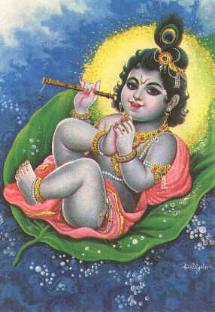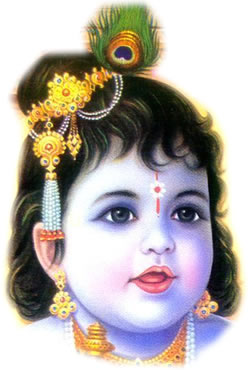|
KRISHNA JANAMASHTAMI
Birth Of Krishna "Krishna was born during the Krishna Paksha (the dark fortnight of the month). The effulgence of the Lord is seen with greater effect when it is dark. In a world of disorder, Krishna was born to establish order. He was born on Ashtami day. Ashtami is associated with troubles and difficulties. When do troubles arise? When righteousness is forgotten. Krishna's advent therefore signifies removal of darkness, end of troubles and effulgence of Supreme Wisdom." Sai Baba, SS, 10/99, last cover page. Naming Of Krishna "Sage Garga was highly respected by both the Pandavas and the Kauravas. He was Kula Guru (preceptor of the clan) of the Yadavas. He was a great scholar, having profound knowledge of the scriptures. He was endowed with great wisdom. Nanda and Yashoda invited him to their house for the naming of their baby. Incarnations usually are Shukia (white), Aruna (orange) or Pita (yellow). But here was a child who was black. Hence Garga considered the name Krishna (black) as most appropriate for the child. After naming the child, Garga narrated several wonderful incidents that were to take place in the life of the child before departing from the house of Nanda." Sai Baba, SS, 9/2001, p. 259 Birthdate Of Krishna "Krishna was born on 20 July, 3227 B.C., during the early morning at 3 a.m." Sai Baba, Summer Showers in Brindavan-1979, p. 159 Meaning Of Krishna "The name Krishna has to be properly understood. 'Krish' + 'Na' = Krishna. This means that He is one who cultivates (Krish) the heart. 'Karsh' + 'Na' is another derivation, which indicates that Krishna is one who attracts ('Karshati iti Krishnah'). Krishna attracts people not only by the matchless beauty of his form. He attracts people by his music, his dance, his sports and his words. Krishna, by his winsome ways, could turn the anger of the Gopis towards him because of his pranks, into an enjoyable joke." Sai Baba, SS, 10/94, pp. 259 &260 "For the Krishna Avatar, the pundits have offered different interpretations from the name alone. The letters in the word Krishna - ka, ra, sha, na and a - have been interpreted as signifying the glorious attributes of Krishna. 'Ka' represents 'Kamalakanta', the Lord of Lakshmi. Other meanings given to the letter are: Kamaleshwara and Kamalagarbha, Lord of the lotus and one from whose navel the lotus has issued. He is also known as 'Kamalabandhu', the kinsman of the lotus. The inner significance of these interpretations is that when divinity manifests within us, the heart blooms like a lotus before the sun. 'Ka' thus symbolizes the sun principle also. 'Ra' represents the principle of delight. 'Sha' represents Vishnu, the source of all wealth and prosperity. 'Na' signifies the Narasimha Avatar, the combination of man and animal in an integral unity. 'A' reveals the 'Akshara swarupa' of the Lord, His imperishable and eternal quality. Going by these letters in the name alone, scholars have derived the divine attributes of Krishna as Avatar. Some others have regarded Krishna as the very embodiment of bliss (Ananda.)" Sai Baba, SS, 9/86, p. 205 Triple Attributes Of Krishna "Krishna is omnipresent. The word has three meanings: 'Krishiti iti Krishna': (The man who ploughs is Krishna). The heart is the symbol of a field. The heart should be cleared of weeds (evil qualities). It should be filled with love. The seeds of the Lord's name should be sown in it. Krishna encourages the devotee to do all this. 'Karshati iti Krishna': (because he attracts, he is Krishna). Krishna has the supreme power of attraction. By his words, his sports, his music and all his actions, he attracts all people. This power of attraction is present in everyone. Hence, everyone is potentially Krishna. 'Krushyati iti Krishna': (Because he imparts bliss, he is called Krishna). Everyone seek? happiness. The Divine, who is the embodiment of happiness, is in you." Sai Baba, SS, 9/97. p. 229
|

